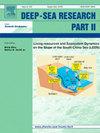The first Mud Dragons (Kinorhyncha) from the Emperor Seamount Chain (Northwestern Pacific) with notes on their biogeography and distribution patterns in the Pacific Deep-Sea
IF 3
3区 地球科学
Q2 OCEANOGRAPHY
Deep-sea Research Part Ii-topical Studies in Oceanography
Pub Date : 2024-10-18
DOI:10.1016/j.dsr2.2024.105430
引用次数: 0
Abstract
Seamounts and oceanic currents play crucial roles in shaping the genetic diversity of species by either acting as barriers or pathways for species dispersal. In the meiofaunal samples collected using ROV facilities at the slope of the Koko Guyot (2172 m) in the southernmost part of the Emperor Seamount Chain in the Northwestern Pacific, we found representatives of three kinorhynch genera, Echinoderes cf. lupherorum Sørensen et al. 2018, Campyloderes cf. vanhoeffeni Zelinka, 1913 and Sphenoderes sp. 1., previously known from other locations in the Pacific. Kinorhynchs were studied and illustrated using light (LM) and scanning electron (SEM) microscopy to prove the species identity and to compare morphological variations with representatives of these species collected from other, very distant localities in the Pacific. We illustrate the pan-oceanic distribution of the collected species with a system of abyssal currents in the Pacific. The probable distribution pattern corresponds with the northward pathway of Antarctic Bottom Water out of the Southern Ocean in the Pacific through the deep-sea area off New Zealand. Echinoderes lupherorum appears to be the first representative of the Echinoderidae with the pan-Pacific distribution. Discussions on the biogeography of Campyloderes cf. vanhoeffeni Zelinka, 1913 and Sphenoderes in the Pacific are also provided.
来自皇帝海山链(西北太平洋)的第一条泥龙(Kinorhyncha),以及关于其生物地理学和太平洋深海分布模式的说明
海山和洋流是物种扩散的障碍或途径,在形成物种遗传多样性方面发挥着至关重要的作用。在西北太平洋皇帝海山链最南端的科科古约特(Koko Guyot,海拔 2172 米)斜坡上使用遥控潜水器采集的小型底栖生物样本中,我们发现了之前在太平洋其他地点已知的三个鞘翅目属的代表,即 Echinoderes cf. lupherorum Sørensen et al.使用光学显微镜(LM)和扫描电子显微镜(SEM)研究并展示了 Kinorhynchs,以证明其物种特征,并将其形态变化与从太平洋其他非常遥远的地点采集的这些物种的代表进行比较。我们用太平洋深海洋流系统说明了所采集物种的泛洋分布。可能的分布模式与南极底层水从太平洋南大洋向北流经新西兰附近深海区域的路径一致。Echinoderes lupherorum 似乎是棘皮动物科中第一个泛太平洋分布的代表。此外,还讨论了 Campyloderes cf. vanhoeffeni Zelinka, 1913 和 Sphenoderes 在太平洋的生物地理学。
本文章由计算机程序翻译,如有差异,请以英文原文为准。
求助全文
约1分钟内获得全文
求助全文
来源期刊
CiteScore
6.40
自引率
16.70%
发文量
115
审稿时长
3 months
期刊介绍:
Deep-Sea Research Part II: Topical Studies in Oceanography publishes topical issues from the many international and interdisciplinary projects which are undertaken in oceanography. Besides these special issues from projects, the journal publishes collections of papers presented at conferences. The special issues regularly have electronic annexes of non-text material (numerical data, images, images, video, etc.) which are published with the special issues in ScienceDirect. Deep-Sea Research Part II was split off as a separate journal devoted to topical issues in 1993. Its companion journal Deep-Sea Research Part I: Oceanographic Research Papers, publishes the regular research papers in this area.

 求助内容:
求助内容: 应助结果提醒方式:
应助结果提醒方式:


